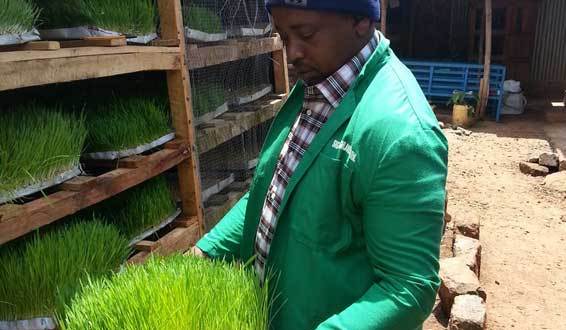Rabbit Farming Kenya: Amos Ndung’u, the owner of Sigona Rabbit and Poultry Farm, has resisted attempts to follow in the footsteps of his neighbours, who have switched to housing development. His eighth-acre farm lies about one kilometre from the Nakuru-Nairobi highway.
He keeps rabbits, poultry and grows various crops, including strawberry in plastic pipes. His three workers who help in construction of poultry and rabbit pens that he sells at Sh5,000 each are also dressed in green overcoats with the name of the farm inscribed at the back as Ndung’u builds a brand.
At any given time, the farmer keeps more than 200 rabbits of various breeds, including New Zealand, California White, Angora, Chinchilla Earlops, Fransk vender, American brown and Martin Sable.
His birds, which number more than 300, include kienyeji chickens, kuroiler, guinea fowls, bantams, doves and ornamental birds such as peacocks. “I went for rabbits and poultry because they take less space. It is easier to domesticate rabbits and chickens than cows.”
Ndung’u has established a hydroponics fodder unit through which he grows wheat and barley to cut his costs of production. The farmer recounts that he started the agribusiness in 2008 with a rabbit a friend gave him.
“I brought the doe home and started to domesticate it. I then looked for a buck and soon the numbers increased fast.” The former telecommunications technician at Zain (now Airtel) has turned his venture into a model farm that attracts visitors from within the country and outside.
How to easily get new Toyota, Suzuki cars on loan and repay in five years
Some of the visitors come from institutions of higher learning, including the University of Nairobi and Kenyatta University, and from foreign countries like Japan and Britain, according to his guestbook.
Ndung’u has built simple but comfortable structures for his birds and rabbits. He has a one-storey cage that hosts his rabbits. The cage is raised about a metre from the ground to keep the animals warm and rodents and mites at bay.
“Cages are key in the success of any rabbit venture. They must be constructed in such a way that they will not expose the animals to harsh weather that include direct sunlight, heavy winds or rain.”
Between the upper and lower floors, there is a slanting polythene paper which drains urine into a container. The urine is later collected for sale. “The paper guards the rabbits that are on the lower floor against the toxic waste excreted by those on the top floor.”
“I researched before I invested Sh100,000 in constructing the structure that measures 10 by 15 feet and is made of iron sheets, wiremesh, wood and cement,” adds the 40-year-old alumni of Kenya Polytechnic, now Technical University of Kenya. He sells an average of 10 rabbits in a good month at between Sh3,500 and Sh4,000, depending on the breed, fetching him between Sh40,000 and Sh50,000.
His biggest customers are hotel operators in Zambezi and Kikuyu township. A kilo of rabbit meat in the area goes for between Sh500 and Sh600. Rabbit manure goes for Sh300 per 50kg bag. In a good month, he sells 30 bags. The farmer also sells rabbit urine and skin.
“For rabbits, one must follow strictly the feeding regime. Rabbits should be fed at most twice a day and must also be supplied with clean water twice a day.” For mature rabbits, he advises that each animal should be fed 100g of pellets per day.
He sells chickens at between Sh800 and Sh1,000 while a tray of 30 egg goes for Sh500. Fertilised eggs for hatching go for Sh1,000 a tray. “I collect three trays a day which earn me Sh1,500. In a month I pocket Sh45,000.”
He says apart from maintaining high standards of hygiene by cleaning pens daily to avoid diseases, a farmer must know basic treatment techniques. “Diseases like Newcastle should be kept at bay by following strictly the vaccine schedule.”
“Poultry also needs to be supplied with clean water, and have mandatory check-up at least once in a month,” adds the farmer who also keeps the birds in storey units. He calls in a veterinary officer once in two weeks to check the birds and rabbits even if they are not sick.
He has a small vegetable garden where he grows spinach, sukuma wiki (collard green), onions and strawberry seedlings in plastic pipes. The pipes are six-feet long. One fills soil mixed with fertiliser in them then waters it and plants seedlings.
He sells the strawberry seedlings at Sh50 each to neighbours earning about Sh2,000 per month. On the other hand, a kilo of onions go for Sh100 while a bag of spinach and sukuma wiki goes for between Sh200 to Sh300. The vegetables fetch him about Sh20,000 in a good month. Rabbit Farming Kenya.









